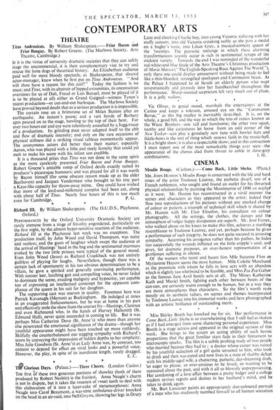PERFORMANCES by the Oxford University Dramatic Society are rarely immune
from a tinge of frivolity engendered, particularly on the first night, by the almost hyper-sensitive reaction of the audience. Richard III at the Playhouse last week was no exception. The production itself, by John Wood and David Thompson, was noisy and restless; and the gusts of laughter which swept the audience at the arrival of Hastings' head in the bag and the sentimental murmurs evoked by the two little princes were typical of the general mood. Even John Wood (Jesus) as Richard Crookback was not entirely guiltless of playing for laughs. Nevertheless, though there was a certain lack of spontaneity in his too obvious determination to be a villain, he gave a spirited and generally convincing performance. With sinister leer, lurching gait and compelling voice, he never failed to dominate the scene, exuding malignity and hypocrisy, yet capable too of expressing an intellectual contempt for the apparent com- pliance of the queen in his suit for her daughter. The supporting cast was uneven in quality. Foremost here was Patrick Kavanagh (Merton) as Buckingham. He indulged at times in an exaggerated frolicsomeness, but he was at home in his part and effectively stole the show from the coarser fry—Hastings, Clarence and even Richmond who, in the hands of Harvey Hallsmith (St. Edmund Hall), never quite succeeded in coming to life. But it was perhaps Miss Catherine Dove (St. Anne's) who more than anyone else penetrated the emotional significance of the drama—though her youthful appearance might have been touched up more ruthlessly. Skilfully she counterbalanced our nagging sympathy with Richard's scorn by conveying the impression of hidden depths to her simplicity. Miss Julie Goodwin (St. Anne's) as Lady Anne was, by contrast, too content to depend for effect on vivid looks and a powerful voice. However, the play, in spite of its inordinate length, rarely dragged. E. C. E. C.


































 Previous page
Previous page